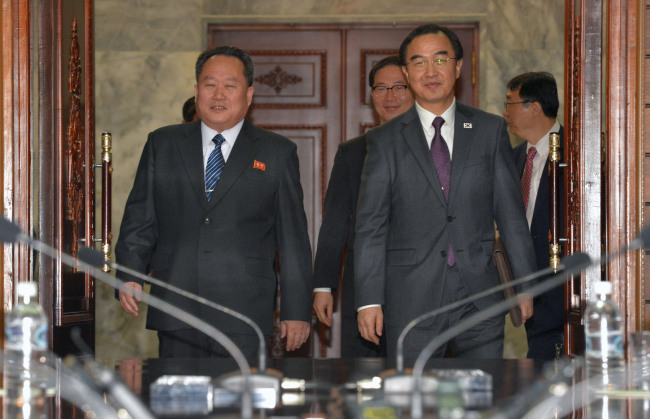The upcoming meeting between South Korean President Moon Jae-in and North Korean leader Kim Jong-un will be the third North-South summit since the end of the 1950-53 Korean War. The first was held between President Kim Dae-jung and North Korean leader Kim Jong-il on June 15, 2000, and the second was held between President Roh Moo-hyun and the same Kim on Oct. 4, 2007.
The statement also said both sides would hold separate working-level talks at the Peace House on April 4 to discuss relevant protocol and security matters for the summit. Similar talks on cross-border communication are planned, but a specific date and venue have yet to be settled, it added.
Seoul’s presidential office Cheong Wa Dae welcomed the news, dubbing the summit as a “groundbreaking opportunity” to bring about peace on the Korean Peninsula.
“As the date of the South-North summit has been set, we will do our utmost to make sure nothing will be neglected in our preparations for the summit during the remainder,” Cheong Wa Dae spokesman Kim Eui-kyeom said.
“It is our hope that all people will become one so the summit can become a groundbreaking opportunity to establish peace on the Korean Peninsula,” he added.
The statement came as the outcome of high-level talks held the same day at the Tongilgak administrative building on the northern side of the border. The meeting kicked off around 10 a.m., according to pool reports.
South Korea’s Unification Minister Cho Myoung-gyon was tapped to head the delegation from Seoul. Chief presidential press secretary Yoon Young-chan and Vice Unification Minister Chun Hae-sung joined Cho in the three-member delegation.
The delegation from Pyongyang was led by Ri Son-gwon, chairman of the North’s Committee for Peaceful Reunification, the cabinet-level agency that oversees inter-Korean affairs.
Thursday’s talks were the second meeting between Cho and Ri. Both were chief negotiators of their respective delegations for high-level talks on Jan. 9, which were the two Koreas’ first formal talks in more than two years.
Prior to the meeting, Cheong Wa Dae said setting a specific date and itinerary details for the summit are likely to be key agenda items at the talks.
Before heading off to the meeting, Cho stressed that the issue of denuclearization on the Korean Peninsula has always been regarded as a main focus of inter-Korean talks. It has remained a key focus throughout the flurry of inter-Korean exchanges following the Jan. 9 high-level talks and is an agenda item that will remain as such, he told a group of reporters in Seoul.
But there was no mention of “denuclearization” in the joint statement released after the talks.
After the talks, when asked whether the issue was raised at the discussion table, Cho merely replied that although there was “sufficient” exchange of opinions on the summit agenda items and both sides have come to a conclusion, more time is needed to place a specific frame on the subjects.
“Such issues are subjects that will be discussed between the leaders (of the respective Koreas at the upcoming summit), so both sides are on the same page about giving more time to the issue with sufficient negotiations. ... If necessary, we decided to take an approach where we will handle such issues through additional high-level talks in April,” Cho explained at a briefing held after the talks.
During the morning portion of the meeting, Cho and Ri each noted the “unprecedented progress” in inter-Korean ties amid a mood of rapprochement created after the North’s participation in the PyeongChang Winter Olympics.
“It’s been less than three months since Jan. 9, but there have been many fruitful results with the issues that exist between the South and North (which is more than what we anticipated in the first place),” said Cho.
In response, Ri said, “Over the past 80 days, there have been many dramatic events that have not been seen earlier.”
Earlier this month, a special envoy for Moon visited Pyongyang and returned with a message from Kim Jong-un expressing the willingness to hold a summit with Moon and talk about the possibility of denuclearization with the United States. US President Donald Trump agreed to meet with Kim in May.
The talks come on the heels of the North Korean leader’s surprise visit to China earlier this week.
According to China’s state-run Xinhua News Agency, Kim held his first summit with his Chinese counterpart Xi Jinping and expressed his commitment to denuclearize. Kim reportedly added that the North’s denuclearization hinges on Seoul and Washington taking “progressive and synchronous measures.”
Kim’s Beijing trip was not discussed with the North during Thursday’s talks, according to Cho.
Meanwhile, Seoul on Wednesday formed an advisory group of 46 experts and former top point men on North Korea for preparations for the April summit. It includes former unification ministers from the liberal administrations of late former Presidents Kim and Roh: Lim Dong-won, Jeong Se-hyun, Lee Jong-seok and Lee Jae-jeong.
By Jung Min-kyung & Joint Press Corps (
mkjung@heraldcorp.com)






![[Out of the Shadows] Seoul room clubs offer drugs to compete for clientele](http://res.heraldm.com/phpwas/restmb_idxmake.php?idx=644&simg=/content/image/2024/11/05/20241105050566_0.jpg)

